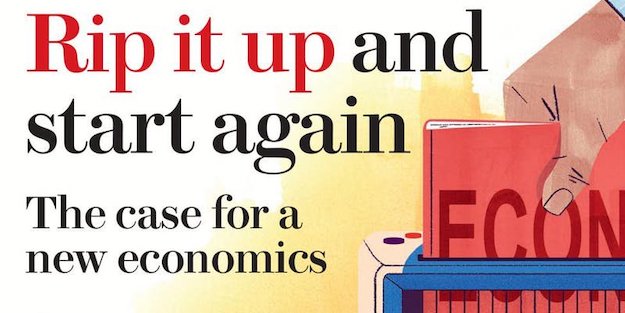In his recent article, “Rip it up and start again”, the case for a new economics”, (April, 2018, Prospect Magazine) Howard Reed joins a growing list of colleagues in calling for a revised approach to economics. Reed and other economists, such as the founders of the “Rethinking Economics” initiative, believe it is time to rip up old textbooks and create economic models that encompass the complexity of our world. Reed believes most evolutionary attempts in economics have simply added to or tinkered with the basic model; Reed advocates a more revolutionary step, a “deconomics,” which would tear up the old assumptions and build a new economic model from the ground up.
THE NEOCLASSICAL PARADIGM
Citing the failure of economists to predict the crash of 2008, Reed highlights the shortcomings of economic paradigms based on the neoclassical model with its reliance on production costs, supply and demand, and unrealistic assumptions about the behavior of consumers. In Reed’s analysis, the “neo-classical” approach fails because it is based on the following assumptions:
1) Individuals and businesses stand as the basic units of evaluation
2) Individuals and firms make rational choices among the all the options
3) Individuals seek to maximize utility while businesses will seek to maximize
profit
4) Individuals and firms use the information they have to act independently
In reality, a system that applies a fixed set of principles to every situation does not tend to hold up in the real world. The theoretical value of a commodity, for example, does not always relate to the price individuals are willing to pay. Neoclassical principles encourage reliance on a solely market-driven economic system, and this has proved faulty time and again when unexpected circumstances arise or people don’t behave as anticipated. It also offers cover for laissez-faire governing tactics that allow inevitable inequities to be ignored. According to Reed, the model is too often cited as a support for questionable public and private policy decisions. Initiatives such as the assault on trade unions and the trading of pension security for reliance on market-driven retirement schemes are notable examples.
One of Reed’s strongest objections to the neo-classic approach is the built-in assumption that individuals and firms will inevitably put themselves first; Reed feels the system is tainted by being both anti-social and overly individualistic. It would be similarly erroneous to assume individuals and businesses always from altruistic motives.
VALUE FREE?
According to Reed, it is impossible to create an approach to economics that is free of value judgments. Value bias is tends to seep in as soon as one moves beyond reporting objective, statistical data; any further assertions about the state of the economy betray some form of judgment. The craving for legitimacy in traditional economics has led to a dependence on the application of scientific and mathematical formulas and equations that perpetuate the illusion of a “value-free” system. Who could resist a set of principles which helps order the bewildering world around us into a set of predictable actions and re-actions, a market-driven system that operates without need for outside interference?
PRESERVATION
Throughout the 20th century and to the present, economic theory has remained tied to the neo-classical paradigm of supply and demand, maximization of utility and profits, and rationality. Rather than addressing problems resulting from underlying assumptions, economists have devised a series of exceptions and add-ons that preserve the current system and lead to further public misconception. Regrettably, universities offering out-of-date or used textbooks, add to the confusion, positing a mythological world in which a state of equilibrium and harmony is the mathematically predictable end point of a market-driven economy.
Despite the work of economists like Arthur Pigou, who introduced the idea of “externality”, the core tenets of neo-classical theory remain. While Pigou offered a way to account for circumstances where the market fails to account for certain benefits and costs, John Maynard Keynes asserted that market forces sometimes need both private and public intervention to preserve equilibrium. None of this work altered basic neoclassical assumptions.
DECONOMICS
What will “deconomics” look like? Foremost, Reed requires that any new system must be based on open and honest discussion about how people actually behave rather than on questionable assumptions. Open acknowledgement about value judgments and how they operate in any approach are vital to success. The features of Reed’s “deconomics” while also dependent on the results of new research on would include:
1. Acknowledgement of unavoidable bias and value judgments in economic analysis
2. Open and honest debate about how the world and economies actually work
3. Honest observations about human behavior
4. Emphasis on the “good life” rather than adherence to pliable, outdated analysis
5. Research that takes into account progress in technology
6. Research and analysis into the complex relationships between employers, employees, and governments
7. A pluralistic approach to economics
Howard Reed is not without critics (see Diane Coyle’s “In Defense of the Economists”, April, 2018, Prospect Magazine,). Neoclassical theory has driven university economics curricula for over 50 years, rendering theories outlined in millions of used textbooks and new economic textbooks hopelessly outdated. Movements like the “Rethinking Economics” initiative strive to correct outmoded information that misleads the population, distorts media coverage, and affects public policy. The weight, one hopes, is on the side of evolution.

